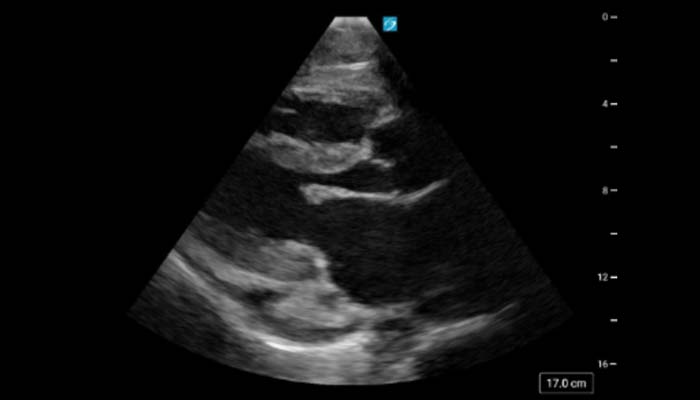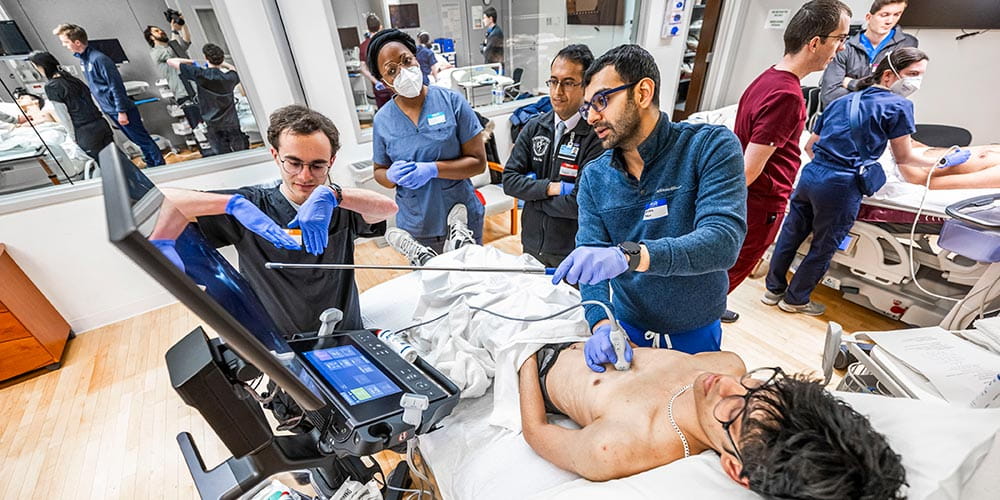Point of Care Ultrasound Pathway

Description and Defining Characteristics
Point of care ultrasonography (POCUS) refers to the practice of using ultrasound at bedside to assist in medical diagnosis and procedures. While initially having presence in the fields of critical care and emergency medicine, POCUS is rapidly becoming a growing skill in general internal medicine and hospital medicine as well. There is now great interest in incorporating POCUS training into medical education at both the medical student and resident levels.
The point of care ultrasound longitudinal three-year pathway allows for select residents with great interest in POCUS to hone their abilities through formal training and assessments, journal clubs, and simulation sessions. Additionally, the pathway provides networking opportunities as well as opportunities to teach various POCUS related topics. While all IM residents will be exposed to ultrasound, pathway members will take a deeper dive into the field as they develop robust image portfolios, connect imaging findings with diagnostic skills, and involve themselves in scholarly projects.

Program Structure
This is a longitudinal, three year pathway involving various lectures, journal club sessions, simulation lab opportunities, portfolio development and steps to initiate the certification process. Components are detailed below.
Core POCUS lectures: Bootcamp series within first few months of year covering basic POCUS topics including cardiac, lung, abdomen, DVT, MSK and volume assessment.
Monthly POCUS lectures: On additional topics including but not limited to ocular ultrasound, VExUS, valvular disease, advance cardiac POCUS, procedures, teaching POCUS, outpatient POCUS. Delivered by faculty and pathway residents.
Journal Club: Alternating with the lectures above, residents will have the chance to discuss literature relating to POCUS and how it can be applied to patient care.
VA POCUS Portfolio: Residents will be required to complete their image portfolio utilizing our excellent POCUS resources available at Louis Stokes VA Medical Center.
Certification: Residents will have opportunities to at least initiate the SHM/CHEST POCUS certification with online modules. Additionally, upon completion of pathway requirements and residency graduation, residents will receive certificate of completion. Keep in mind that POCUS use privileging is dependent on hospital system where one practices.
Residents of the POCUS pathway will be required to complete the following prior to graduation:
- Attend all Core POCUS lectures and at least 60% of Monthly POCUS lectures
- Deliver 1-2 Journal Clubs
- Deliver 1-2 POCUS related lecture of their choice
- Complete VA POCUS Portfolio
- Develop a scholarly project related to POCUS
Upon completion of pathway and residency graduation, residents will receive certification of completion of pathway.
Application
The pathway will be open to incoming PGY1s and applications will be sent out to all matched residents soon after Match Day.
Pathway Director

Abhishek Thakur, MD
Dr. Thakur is a hospitalist at the Louise Stokes VA Medical Center. He received his undergraduate degree at the University of Connecticut before completing medical school at Frank H Netter MD School of Medicine in 2020. He graduated Internal Medicine residency at University Hospitals Cleveland Medical Center and chose to stay in Cleveland so he can continue working with UH residents. His academic interests include graduate medical education and point of care ultrasound. Outside of the hospital, Dr Thakur enjoys biking, golfing, cooking and spending time with his family.


